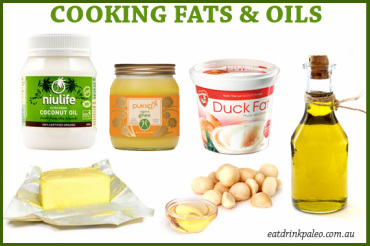
I have sent this article from Eat Drink Paleo to so many people I just had to share it here as well. I could not have written it better than Ms. Irena. Such good info!
One of the first things I tell people when they ask me about healthy eating is to sort out their fats and oils. It’s really worrying how many people still use canola or vegetable oil as their standard frying fat or how often I see people smoking the crap out of extra-virgin olive oil. Don’t even get me started on margarine!
The Bad Guys: Vegetable & Seed Oils
Together with high-fructose corn syrup and soy meat substitutes, the industrial revolution was responsible for the mass production of highly processed polyunsaturated vegetable and seed oils, such as soybean, canola and corn oil. While naturally occurring, minimally processed fats and oils, such as olive oil and butter, are a healthy source of energy and nutrients, highly processed seed oils contain very high levels of omega-6 fatty acids, which when consumed in excess have detrimental health effects. Problem is – these oils are present in nearly everything we eat nowadays. Grain-fed livestock, where a lot of meat produce comes from, is also high in omega-6. A diet high in omega-6 is associated with an increase in inflammatory diseases such as cardiovascular disease, type 2 diabetes, rheumatoid arthritis, asthma and cancer to mention a few.
In addition to omega-6 fatty acids, most polyunsaturated oils are highly prone to oxidation and rancidity, which turns these so-called ‘heart healthy’ oils to toxic liquids. And although some of them have a high smoking point, making them seemingly suitable for frying and cooking at high temperatures, their chemical structure is so unstable (again, due to the fatty acid ratio) that they really shouldn’t be cooked with at all. For these reasons, it’s best to avoid the following fats and oils: corn, cottonseed, soybean, canola, safflower, sunflower, peanut, grape seed, vegetable and margarine, which is made from aforementioned oils.
What are the good fats & oils?
A healthy diet embraces saturated fats and healthy plant-based oils and avoids highly refined and processed polyunsaturated oils, such as those mentioned above, due to their toxic properties and high omega-6 fatty acids. Your fat intake should come from meat, seafood, eggs, nuts, avocados, fats and oils used in food preparation.
It’s important to know which type of fat or oil is best suited to which food preparation method.
Keep In Mind:
One of the first things I tell people when they ask me about healthy eating is to sort out their fats and oils. It’s really worrying how many people still use canola or vegetable oil as their standard frying fat or how often I see people smoking the crap out of extra-virgin olive oil. Don’t even get me started on margarine!
The Bad Guys: Vegetable & Seed Oils
Together with high-fructose corn syrup and soy meat substitutes, the industrial revolution was responsible for the mass production of highly processed polyunsaturated vegetable and seed oils, such as soybean, canola and corn oil. While naturally occurring, minimally processed fats and oils, such as olive oil and butter, are a healthy source of energy and nutrients, highly processed seed oils contain very high levels of omega-6 fatty acids, which when consumed in excess have detrimental health effects. Problem is – these oils are present in nearly everything we eat nowadays. Grain-fed livestock, where a lot of meat produce comes from, is also high in omega-6. A diet high in omega-6 is associated with an increase in inflammatory diseases such as cardiovascular disease, type 2 diabetes, rheumatoid arthritis, asthma and cancer to mention a few.
In addition to omega-6 fatty acids, most polyunsaturated oils are highly prone to oxidation and rancidity, which turns these so-called ‘heart healthy’ oils to toxic liquids. And although some of them have a high smoking point, making them seemingly suitable for frying and cooking at high temperatures, their chemical structure is so unstable (again, due to the fatty acid ratio) that they really shouldn’t be cooked with at all. For these reasons, it’s best to avoid the following fats and oils: corn, cottonseed, soybean, canola, safflower, sunflower, peanut, grape seed, vegetable and margarine, which is made from aforementioned oils.
What are the good fats & oils?
A healthy diet embraces saturated fats and healthy plant-based oils and avoids highly refined and processed polyunsaturated oils, such as those mentioned above, due to their toxic properties and high omega-6 fatty acids. Your fat intake should come from meat, seafood, eggs, nuts, avocados, fats and oils used in food preparation.
It’s important to know which type of fat or oil is best suited to which food preparation method.
Keep In Mind:
- Saturated fat is typically more heat stable and doesn’t oxidate as quickly as monounsaturated and polyunsaturated fats, which makes it more suitable for frying and other high temperature cooking.
- Nut oils and olive oil are more fragile and can be cooked with but are best used unheated to retain the most antioxidants, vitamins and flavor.
- Refined oils will usually have a higher smoking point. Ideally, they should be expeller-pressed, which indicates that the oil was extracted using a mechanical process rather than with heat and chemicals. These are best for high temperature cooking such as deep-frying.
| Best For Hot Use (From highest to lowest temp. stability)
| Best For Cold Use
|
Smoke points, Cooking Uses & Shelf Life
The smoke point of a fat or an oil is the temperature at which it gives off smoke and starts to break down and oxidize, losing nutrients and developing toxic properties. Most foods are fried at around 170°C -240°C and it’s always best to choose a fat or oil with a smoking point just above that.
The smoke point of a fat or an oil is the temperature at which it gives off smoke and starts to break down and oxidize, losing nutrients and developing toxic properties. Most foods are fried at around 170°C -240°C and it’s always best to choose a fat or oil with a smoking point just above that.
| Fat/Oil Almond Oil Avocado Oil Macadamia Oil Virgin Olive Oil Extra Virgin Olive Oil Coconut Oil Flaxseed Oil Butter Ghee | Use For salad dressings, marinades, stir-fry, sauteing salad dressings, marinades, stir-fry, sauteing, pan frying, roasting salad dressings, condiments, marinades, stir-fry, sauteing, pan frying, roasting, searing, baking salad dressings, condiments, marinades, baking, sauteing, pan frying, roasting salad dressings, condiments, marinades, low heat sauteing and slow cooking Medium heat cooking, baking, smoothies Salad dressings, smoothies, raw cooking Baking, sauteing, finishing, thickening sauces, slow cooking, condiments Sauteing, baking, thickening sauces, pan frying | Smoke Point 420F 520F 390F 420F 320F 350F (higher for refined coco oil) Never Heat 350F 375-485F (depending on purity) | Shelf Life 6-12 months 12 months 6-12 months 6-12 months 6-12 months 12-16 months Keep Refrigerated, 3-4 months 1 month in the refrigerator, 6-9 months in freezer 1-2 years, out of the fridge in an air tight contaier |

